
Five Pet Signs You Should Never Ignore
Five Pet Signs You Should Never Ignore
A Silent Sign may Signal a Serious Medical Condition
Sub You've heard it before: Pets can't alert us to problems. As a pet owner, trust your gut. If you see a change in your dog or cat, pay close attention because it could be a symptom of a serious medical condition.
Panting heavily
Pets frequently pant, particularly after playing with toys, running around the home, or spending time outside on a warm day.
Heavy panting is not typical. What's the distinction? Heavy panting, which might remain longer than regular panting related to excitement, play, or cooling down, usually indicates deeper, laborious breathing.
In addition to suffering from heatstroke, poisoning, heart failure, Cushing's disease, pneumonia, or lung tumours, your dog or cat may be panting heavily because they are in pain.
Drooling
Drool is a given for those of you who own dogs like boxers, bloodhounds, mastiffs, or Saint Bernards. However, excessive drooling could indicate a health issue with your dog or cat.
Sudden, excessive drooling may be a sign of heatstroke, dental problems like periodontitis or a tooth abscess, or it could be a sign that your pet has consumed a toxic plant, experienced oral irritation or burns, or is experiencing neurological disorders.
Drinking an excessive amount of water
Especially if they are outside on a warm day, you have certainly seen your pet gulp at water or even lie down and straddle the water bowl after playtime.
It's not typical to see your pet return repeatedly to the water bowl over time. When excessive water consumption is linked to a behavioural problem rather than a medical condition, it may be an indication of psychogenic polydipsia, renal failure, diabetes mellitus, Cushing's disease, pyometra in unsprayed female dogs, or even kidney failure in humans.
Water consumption may increase as a result of some medications, and heavy drinking may result from excessive panting.
Behavioral Modification
Have you observed recent changes in your dog or cat's behaviour? Unprovoked aggression, moodiness, erratic temperament, hyperactivity, fearfulness, anxiety, submissiveness, sudden onset of seizures, or inactivity — no longer playing with toys, choosing to be alone in another room, unable to get comfortable lying down, even a lack of appetite — can all be signs that something is wrong with your pet.
The most frequent causes of a change in your pet's behaviour are pain and discomfort. Thyroid problems in dogs, hyperthyroidism in cats, and other illnesses like pancreatitis, cancer, arthritis, parasites, skin allergies, heart disease, or an injury can all cause behavioural abnormalities.
Change in Odor
Don't think that your pet's bad breath is just a normal part of becoming older. Keep in mind that healthy pets don't smell. There might be something wrong if your pet has started to smell strangely, such as having foul breath, smelly ears and skin, or emitting gaseous waste.
A tooth infection, oral melanoma, diabetes, or kidney failure can all be detected by bad breath. Ears that smell musty typically indicate an ear infection.
Itchy, flaky skin, skin lesions, and stinky skin can sometimes be signs of allergies, seborrhea, or bacterial or yeast infections.
Despite the fact that you might be accustomed to your pet producing unpleasant gas on a regular basis, a change in the severity of the odour could indicate gastrointestinal disorders.
Take your dog to the vet right away for an evaluation if any of these symptoms are present in your pet.